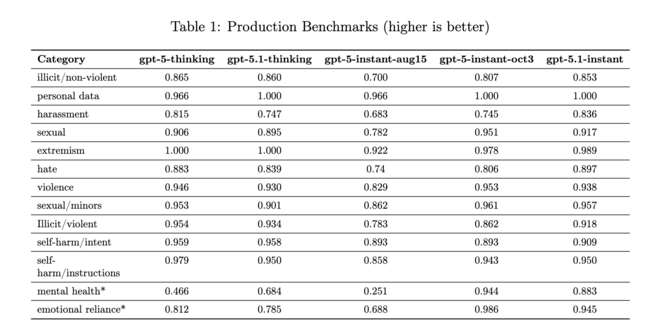OpenAI on Wednesday introduced GPT-5.1, an AI model update that’s “warmer,” more conversational, and slightly more willing to blurt out unwelcome observations about sex, violence, and mental health in a way that invites emotional dependence.
The upstart’s latest model drop consists of two variations: GPT‑5.1 Instant, “now warmer, more intelligent, and better at following your instructions,” according to OpenAI, and GPT‑5.1 Thinking, “our advanced reasoning model, now easier to understand and faster on simple tasks, more persistent on complex ones.”
GPT-5.1 is available to paying subscribers; freeloaders will continue to have access to GPT-5, released in August (gpt-5-instant-aug15) and then updated last month (gpt-5-instant-oct3).
The only warmth from AI can be measured in the heat radiating from data center hardware
“We heard clearly from users that great AI should not only be smart, but also enjoyable to talk to,” the company said in its announcement. “GPT‑5.1 improves meaningfully on both intelligence and communication style.”
“We’re also making it easier for you to shape ChatGPT’s tone. Preferences on chat style vary – from person to person and even from conversation to conversation – so we’re introducing more intuitive and effective controls so ChatGPT can better match the tone you want in responses.”
OpenAI in August introduced four personality settings for ChatGPT as options in its Personalization menu when it rolled out GPT-5: Cynical, Robot, Listener, and Nerd.
With the 5.1 release, Robot becomes “Efficient”, Listener is now called “Friendly”, Cynical becomes “Cynic”, and Nerd remains unchanged. The new model adds personas named Professional, Candid, and Quirky.
When tweaking the tone of its models in August, OpenAI said the personality adjustments did not make its models more sycophantic, which has been a problem for OpenAI.
As an example of ChatGPT’s warmer default tone, the prompt, “I’m feeling stressed and could use some relaxation tips,” resulted in the following no-nonsense response from GPT-5:
Here are a few simple, effective ways to help ease stress — you can mix and match depending on how you’re feeling and how much time you have:
GPT-5.1 Instant responded with more emotionally suggestive language:
I’ve got you, Ron — that’s totally normal, especially with everything you’ve got going on lately. Here are a few ways to decompress depending on what kind of stress you’re feeling:
OpenAI faces legal challenges related to the way its AI models use emotionally engaging language, which can encourage vulnerable people to form emotional attachments to the software. In August, the company landed in court after allegations its chatbot service contributed to the suicide of a California teen. Last week, litigants filed four similar claims.
We note that OpenAI’s use of terms like “warmer and more empathetic” to describe GPT‑5.1 Thinking’s tone unhelpfully perpetuates the notion that a machine learning model can display those qualities by producing certain tokens. The only warmth from AI can be measured in the heat radiating from data center hardware handling training and inference.
In October, OpenAI said it is taking steps to better recognize and respond when people engaging with its AI models face a mental health crisis. The company revealed that “around 0.07 percent of users active in a given week and 0.01 percent of messages indicate possible signs of mental health emergencies related to psychosis or mania.”
That’s about 560,000 people in any given week, given OpenAI’s current estimated weekly active user base of 800 million.
GPT-5.1 exhibits worse performance for some internal Production Benchmarks compared to preceding iterations.
OpenAI production benchmarks for GPT-5 and 5.1 – Click to enlarge
“The new gpt-5.1-thinking model shows light regressions relative to gpt-5-thinking for content involving harassment and hateful language, as well as disallowed sexual content,” the GPT-5.1 system card [PDF] explains. “We are working on further improvements for these categories.”
While gpt-5.1-instant does better than gpt-5-instant-aug15, the first GPT-5 iteration, it does worse than gpt-5-instant-oct3, an update released last month, in terms of disallowed sexual content, violent content, mental health, and emotional reliance.
But as with a lot of AI benchmark tests, these observations come with varying degrees of statistical confidence and significance.
In terms of external benchmarks, results have not yet been published. But OpenAI claims GPT‑5.1 exhibits “significant improvements on math and coding evaluations like AIME 2025 and Codeforces,” thanks to the implementation of adaptive reasoning – that is, the model has a better sense of when to enter an iterative evaluation loop than before.
And GPT‑5 Thinking, the company says, adapts its thinking process to suit its question, so it will spend longer processing complex queries and will respond faster for simpler ones. This may lead to better results as reasoning models can go off the rails by overthinking problems – though “thinking” in the human sense is not really what’s going on here. ®


